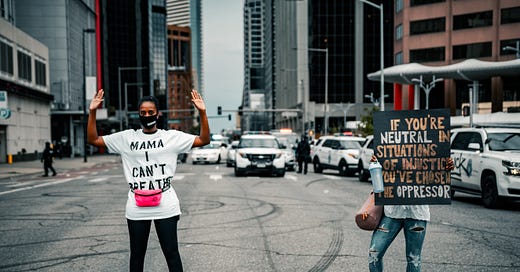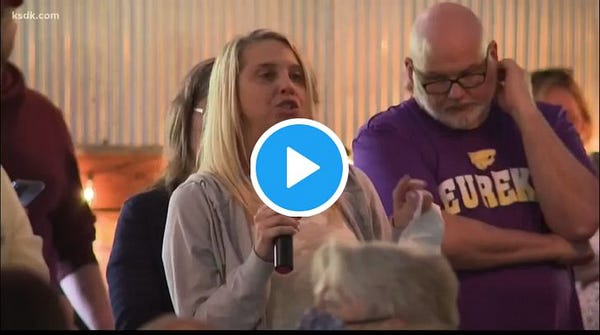The Counterproductive Campaign Against Critical Race Theory
Every attack on this discourse is only proof this discourse is necessary.
I’ve been steeped in social justice language and thinking for most of my adult life. Concepts like “privilege” and “oppression” are part of my vernacular. In grad school, I taught several semesters of a course called Gender Justice, in which I convinced farm boys from Rep. Steve King’s district — who started the course calling me a “faggot” under their breath — to understand and dissect how patriarchy reinforces male privilege. When I hear the phrase “systemic racism,” it’s like, yeah, no question — that’s how the world works.
So I’ve watched with wonderment and irritation as conservatives have set their sights on attacking “critical race theory” (CRT) over the past year. To me, it sounds the same as trying to block the teaching of evolution or heliocentrism in schools. Imagine if there were a group of people who despised the reality that the sky is blue and thus insisted that we must block schools from teaching colors (let alone the science as to why we perceive the sky as blue). Most of the people opposing CRT make clear every time they comment on it that they either don’t understand the first thing about it and/or they perceive it as a threat to their beliefs. (What beliefs might those be??)
If you haven’t been noticing it, there really is a campaign underway. Trump tried to ban CRT’s incorporation into nondiscrimination trainings (which Biden reversed); states like Arkansas, Tennessee, Texas, and Idaho have been advancing anti-CRT bills (and Idaho’s is now law); and a Texas school district made news this past week when CRT became a wedge issue for their school board elections because they prefer their school only teach “common American heritage and Texas values.” (“Common” for whom exactly??) Oh, and let’s not forget the ongoing backlash to the New York Times’ 1619 Project, which by acknowledging the slavery-based roots of this country directly overlaps with CRT.
This is an incredibly obvious effort to stifle free speech with the goal of preserving the very kind of white supremacy and control that CRT exists to critique. By campaigning against CRT, conservatives are literally adding to the robustness of its approach. The people joining these campaigns might not think they’re being racist, but I don’t hesitate to conclude that they are very much working to protect and enshrine racism in our society.
Some folks reading this might readily agree with those conclusions. Some might think that’s all a bit harsh and have some questions or doubts about what CRT is really about. And some might already be convinced that it’s CRT that’s actually “racist” and that this confession of mine — that I’m one of the people conservatives are talking about when they throw “woke” around all the time now — means they don’t even want to hear me out as to why I very much disagree with them.
But I used the word “wonderment” above to explain my reaction to these campaigns because I really am intrigued in a way I want to explore further. The pressing question for me is: If you reject critical race theory (assuming you even know what that means), how does your brain process racial disparities? And to be honest, I can’t really come up with an answer for folks that isn’t just, “You’re a racist (but maybe don’t know it).”
That would include people like this mother who was very upset about CRT being taught in her kid’s Missouri school:
Now, I’m no critical race theorist, and I’m not even pretending to be an expert on the topic. But I thought I’d use this space to walk you through what I, a white guy, think is really happening in this campaign against CRT, as well as how I understand CRT and why I think it’s so important. When I say that its opponents are propping up racial inequality, I want you to understand that I’m not just trying to “cancel” or silence them; I genuinely believe they are perpetuating harm, whether they realize it or not. I’m not going to compensate for the countless books and experts out there, but here are a couple of thoughts about what’s really happening that I hope are helpful.
What is “racism”?
Before we even talk about CRT, we have to acknowledge that conservatives aren’t actually engaging with CRT. Their campaign against CRT is a façade for the way that they have tried to define “racism” very narrowly so that they can claim they are not “racist” even as they are going to great lengths to prop up systemic racism. It really is a war of words and an attempt to avoid accountability for harm.
The conservative interpretation of “racist” requires two intertwined criteria: that the actions be overt and intentional in their harm against a racial group. Thus, if a law just happens to disproportionately harm Black people, but it doesn’t actually mention Black people, and none of the lawmakers specifically talked about the impact they wanted to have on Black people, conservatives would say that’s not “racist” (e.g. Georgia’s new voting law).
So many examples of this narrowly-defined use of “racist” are available on almost any given day. It’s what Sen. Tim Scott meant in his response to Biden’s recent congressional address that we’re not a “racist” country — and what President Biden meant in his follow-up that he doesn’t think the American people are “racist.” It’s what Mark Levin meant when he declared that capitalism is incapable of “racism” (conveniently ignoring several hundred years of the transatlantic slave trade). It’s what Sen. Ted Cruz and his fellow defenders of the white nationalist insurrection mean when they grill Biden’s nominees with questions like whether the Department of Justice is a “racist” institution.
The clear goal is to absolve the country, its systems, its institutions, its leaders, and its people of any responsibility for racial inequality. It’s a strict binary: You’re either “racist” or you’re not, and literally nothing short of the KKK is “racist.” If you say that any of those other things or people are racist, you’re clearly wrong and you’re the bad guy for demeaning them. But if you agree that those things aren’t “racist” by that narrow definition, then you have no business pointing any fingers at them for perpetuating inequality.
It really is some bullshit — and it’s exactly the bullshit CRT is designed to dismantle.
Pesky Knowledge
CRT is literally about taking the opposite approach from that definition of “racism.” It’s about acknowledging that there are racial inequalities and inequities that persist in society in spite of the lack of overt, intentional racism. What are the actions and motivations that might not express racism or even intend racism, but nevertheless contribute to racial inequality? (Maybe they use language like “economic insecurity” instead, as an example.) CRT tries to understand why those inequities exist, what systems created them in the past and/or perpetuate them in the present, and how we can overcome them.
CRT is literally the arch nemesis of conservatives who are willing to let those inequities continue. Consider this exchange between propagandist Dennis Prager and opportunist Nikki Haley, in which Prager says kids should be taken out of schools that teach the 1619 Project and Haley insists that CRT teaches kids “that they’re racist” as she defends colorblindness.
This description is certifiably false. CRT does not teach kids that they’re racist. It does teach that people (including/especially white people) have a responsibility to acknowledge the way systems of race have shaped their understandings of the world around them and work to resist racism in their own lives. But because conservatives only understand “racism” through their narrow lens, they can’t separate out responsibility from blame. Given CRT overtly and intentionally acknowledges and interacts with race — and directly challenges people to think about how their own race interacts with their behavior — they see it as a fit for their definition of “racist.” Thus, CRT is the thing that’s “racist,” as Trump explicitly said, thereby making it harmful and the people who oppose it the good guys.
To put it a shorter way, conservatives call attempts to acknowledge and fix racial inequality “racist” because they’d rather allow the systems of inequality to persist than take any ownership of their contributions to it. It’s literally a campaign to defend inequality by keeping anybody from learning how to be anti-racist. It’s no surprise that this campaign against CRT and the 1619 Project is happening just as Trumpism has pulled conservatives so much further right that their racist actions are far less subtle and dog-whistle-y than before.
Put yet another way, a whole lot of white people think CRT is about making them feel guilty. It’s not, and their guilt is still part of the problem.
Guilt And Fragility
I’d like to share a personal anecdote about how I learned about some of the ways I was perpetuating systemic racism. Because I did not grow up around Black people, I absorbed a lot of messages about them from the news and pop culture. Through stereotypes and other kinds of conditioning, I was taught to believe that Black people are less safe to be around and more prone to being criminals — even if I didn’t realize it. If you’d asked me when I was younger if I actually thought those things, I’d of course have said no, and I might have even taken offense at the suggestion!
But some of the trainings and courses I took helped me to examine my behavior and realize that the conditioning was there. For example, had I ever crossed the street to avoid crossing paths with a Black person? Yeah, I had. Had I ever reached for my wallet to make sure a Black person hadn’t pickpocketed me? Yeah, I had. These microaggressions were not intentional decisions I had made, but subconscious behaviors based on how I’d been conditioned to respond to encountering Black people on the street. They were nevertheless behaviors that could send a message to Black people that they are less trustworthy, less deserving of kindness, or simply less human.
Here’s the thing: When society acculturates us to that kind of shit, it’s not just something you can unlearn. So much of it is programmed in there in ways we don’t even realize. But we can learn to decondition ourselves — to recognize when that subconscious instinct is kicking in and consciously reject it. It’s one thing to say I don’t trust Black strangers any less and another to make sure my behavior matches up.
That’s what the work looks like: owning the conditioning and taking responsibility for correcting it. It is a journey you commit to taking, not a switch you flip. There will be new assumptions and behaviors I end up making around all kinds of different people and I have to keep working through them and bettering myself.
Now, I’ve just admitted that I engaged in overt, unintentional racism, but because I’ve admitted being aware of it, does that make it intentional? I’m sure some people reading this think so and now want to paint me as “racist.” And a lot of people who’ve been exposed to CRT react in just that way. That’s where we encounter the obstacles of guilt and fragility.
Which is worse: the discrimination Black people experience or your feelings as a white person when confronted about the ways you’re contributing to it? As Robin DiAngelo outlines in her incredible book White Fragility, white people’s response to these kinds of trainings and ideas is often to defend their reputation. They’re not “racist” and how dare it be implied that they are! They are centering themselves as a barrier to understanding how to do better by others.
If I choose to feel guilty or attacked for realizing my behaviors, I help no one. Those feelings are an excuse not to do the work. But they’re also not accurate feelings. I certainly feel bad when I realize I’ve done something to reinforce systemic racism, but it’s not my fault that I was conditioned that way. I can either feel sorry for myself, or I can work to correct my behavior so it better matches my values.
So when people CRT or call it “racist”? That belies a lack of understanding and an unwillingness to do the work. Likewise, insisting that the 1619 Project tells the “wrong” history ignores how people from other (non-white) perspectives perceive that history.


It’s worth noting that a 2018 report from the Southern Poverty Law Center found that only 8% of high school seniors could identify slavery as the central cause of the Civil War, while only 44% even knew that slavery was legal in all the colonies during the American Revolution. In terms of what history we’re teaching, it’s not one that’s even true of the milestones we do recognize, let alone the ones we don’t.
I want to frame this all one other way to explain why we need CRT if we actually claim to care about equality.
How Do We Fix Racial Inequality?
Let’s revisit the question I posed above: If you reject critical race theory (assuming you even know what that means), how does your brain process racial disparities? I’m looking at you, Heritage Foundation.


Here’s a real-world example. We have seen during the COVID-19 pandemic that people of color, especially Black Americans, have been more likely to contract COVID-19 and more likely to die of it when they do — and there isn’t a biological reason. With that knowledge, the obvious next step is to ask why that has happened and how do we fix it.
We know why it is. It’s a complicated answer, but we know most of the factors that contributed to it. A few examples:
They’re more likely to live in multi-generational homes in crowded neighborhoods in large cities, which has made social distancing more difficult.
They’re more likely to have pre-existing health problems, due to factors including lack of access to nutritious food (food deserts), being more likely to live closer to pollution, and generally not having access to health care.
They’re more likely to work in the service industry as front-line workers, meaning they’ve been at far more risk of exposure if they wanted to maintain an income.
A pretty straight line can be drawn from these conditions to slavery and segregation, especially redlining. A group of Harvard researchers found, for example, that had slavery reparation payments been made in the state of Louisiana before the pandemic, it would have reduced coronavirus transmission anywhere between 31% to 68%. That would have been for all Louisianans of all races. That’s a lot of lives saved.
These are just factors from our country’s legacy of discrimination, to say nothing of the discrimination Black people still face in health care, employment, housing, and the criminal justice system. Systemic racism is in the air we breathe.
We haven’t gotten to how to fix it, but do opponents of CRT even get this far in contemplating the problem?
Let’s pretend that the anti-CRT folks are being honest that they believe any person born anywhere can hypothetically achieve anything regardless of their race. Can they even acknowledge the COVID-19 disparity? Does it mean anything to them? Or do they just shrug their shoulders and say, “There’s nothing we can do.”
All of the factors I just laid out are part of the systemic racism we require CRT to understand and process. Our country isn’t some video game where we can just hit reset and start over with what we know now. All of the vestiges of our past racist practices (including before 1776) are still very much impacting Black Americans in 2021 — in part because we’ve done very little to correct them. If such a thing as a “post-racial society” can even exist, it won’t be seen for many generations to come. How do you even begin to answer the question of how to fix a problem costing thousands of lives if you can’t acknowledge what’s broken?
And of course, that next part of the conversation immediately gets into restrictions on voting, gerrymandering, Senate malapportionment, the filibuster, the electoral college, and attempts to roll back “disparate impact,” all of which also serve as barriers to Black people achieving the equity they deserve. I don’t think it’s a coincidence that the same people who oppose CRT are also defending all of these anti-democratic systems; the goal is the same: maintaining the status quo of white power.
So are the people working to silence CRT and the 1619 Project “racist”? It doesn’t really matter whether we sort individuals into “racist” and “not racist.” It’s a question of how all of us are either working to dismantle racial inequality or reinforce it. Those trying to censor such questions are very much trying to maintain racial disparities, even if they think the only reason they oppose CRT is because their feelings will get hurt. Their fragility is just as much a part of the problem.
How do you fix racial disparities without critical race theory? You don’t — that’s the point.
If you’re remotely intrigued to learn more about this topic, please seek out books like White Fragility and Ibram X. Kendi’s How To Be An Antiracist, revisit the many fantastic pieces that were part of the 1619 Project, and seek out the many Black writers who actually identify as Critical Race Theorists! One book that really helped me understand a lot was Why Are All The Black Kids Sitting Together In The Cafeteria? by Beverly Daniel Tatum, which got a second edition a few years ago. Whatever you do, don’t let one white guy’s perspective be the last word you hear on this topic.
If you liked what you read here, please consider sharing this post on social media and encourage others to subscribe:
You can also follow me and share feedback with me on Twitter and Facebook.
Until next time, stay platinum!








